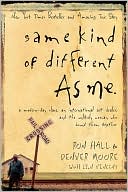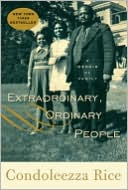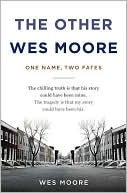The Hemingses of Monticello: An American Family
Winner of the National Book Award and the Pulitzer Prize: “[A] commanding and important book.”—Jill Lepore, The New Yorker\ This epic work—named a best book of the year by the Washington Post, Time, the Los Angeles Times, the San Francisco Chronicle, and a notable book by the New York Times—tells the story of the Hemingses, whose close blood ties to our third president had been systematically expunged from American history until very recently. Now, historian and legal scholar Annette...
Search in google:
Winner of the National Book Award and the Pulitzer Prize: “[A] commanding and important book.”—Jill Lepore, The New YorkerThe Washington Post - Fergus M. Bordewich…monumental and original…Liberating the woman known to Jefferson's smirking enemies as "dusky Sally" from the lumber room of scandal and legend, Gordon-Reed leads her into the daylight of a country where slaves and masters met on intimate terms. In so doing, Gordon-Reed also shines an uncompromisingly fresh but not unsympathetic light on the most elusive of the Founding Fathers…In this magisterial book, she has succeeded not only in recovering the lives of an entire enslaved family, but also in showing them as creative agents intelligently maneuvering to achieve maximum advantage for themselves within the orbit of institutionalized slavery.
Chronology of the Hemings Family 11Preface 15Introduction 21Pt. I Origins1 Young Elizabeth's World 372 John Wayles: The Immigrant 573 The Children of No One 774 Thomas Jefferson 915 The First Monticello 1116 In the Home of a Revolutionary 131Pt. II The Vaunted Scene of Europe7 "A Particular Purpose" 1538 James Hemings: The Provincial Abroad 1699 "Isabel Or Sally Will Come" 19110 Dr. Sutton 20911 The Rhythms of the City 22412 The Eve of Revolution 24913 "During That Time" 26414 Sarah Hemings: The Fatherless Girl in a Patriarchal Society 29015 The Teenagers and the Woman 30816 'His Promises, on Which She Implicitly Relied" 32617 "The Treaty" and "Did They Love Each Other?" 35318 The Return 376Pt. III On the Mountain19 Hello and Goodbye 39720 Equillibrium 41421 The Brothers 43722 Philadelphia 45523 Exodus 48024 The Second Monticello 50425 Into the Future, Echoes from the Past 52126 The Ocean of Life 54027 The Public World and the Private Domain 56228 "Measurably Happy": The Children of Thomas Jefferson and Sally Hemings 58629 Retirement for One, Not for All 60630 Endings and Beginnings 629Epilogue 655Acknowledgments 663Notes 669Selected Bibliography 737Index 755
\ Fergus M. Bordewich…monumental and original…Liberating the woman known to Jefferson's smirking enemies as "dusky Sally" from the lumber room of scandal and legend, Gordon-Reed leads her into the daylight of a country where slaves and masters met on intimate terms. In so doing, Gordon-Reed also shines an uncompromisingly fresh but not unsympathetic light on the most elusive of the Founding Fathers…In this magisterial book, she has succeeded not only in recovering the lives of an entire enslaved family, but also in showing them as creative agents intelligently maneuvering to achieve maximum advantage for themselves within the orbit of institutionalized slavery.\ —The Washington Post\ \ \ \ \ Publishers WeeklyThis is a scholar's book: serious, thick, complex. It's also fascinating, wise and of the utmost importance. Gordon-Reed, a professor of both history and law who in her previous book helped solve some of the mysteries of the intimate relationship between Thomas Jefferson and his slave Sally Hemings, now brings to life the entire Hemings family and its tangled blood links with slave-holding Virginia whites over an entire century. Gordon-Reed never slips into cynicism about the author of the Declaration of Independence. Instead, she shows how his life was deeply affected by his slave kinspeople: his lover (who was the half-sister of his deceased wife) and their children. Everyone comes vividly to life, as do the places, like Paris and Philadelphia, in which Jefferson, his daughters and some of his black family lived. So, too, do the complexities and varieties of slaves' lives and the nature of the choices they had to make-when they had the luxury of making a choice. Gordon-Reed's genius for reading nearly silent records makes this an extraordinary work. 37 illus. (Sept.)\ Copyright © Reed Business Information, a division of Reed Elsevier Inc. All rights reserved.\ \ \ Library JournalThis multigenerational saga traces mixed-race bloodlines that American history has long refused fully to acknowledge. Blending biography, genealogy, and history, Gordon-Reed (history, Rutgers Univ.; law, New York Law Sch.; Thomas Jefferson and Sally Hemings: An American Controversy) brings to life the family from which Sally Hemings (1773-1835) came and the family that she and Thomas Jefferson (1743-1826) created. Sally bore five surviving children for the man who penned the Declaration of Independence and later became the new nation's third president. In a three-part, 30-chapter tour de force through voluminous primary and secondary sources, including Jefferson family correspondence, Gordon-Reed reconstructs not simply the private life and estate of an American demigod but reveals much of the characteristic structure and style of early Virginia society and the slavery that made possible much of the Old Dominion's position and pleasure. Moreover, she ushers forth slaves from the usual shadows of historical obscurity to show them as individuals and families with multifaceted lives. This is a masterpiece brimming with decades of dedicated research and dexterous writing. It is essential for any collection on U.S. history, Colonial America, Virginia, slavery, or miscegenation. [See Prepub Alert, LJ5/1/08.]\ —Thomas J. Davis\ \ \ \ \ \ Kirkus ReviewsThe unusual history of an enslaved family whose destiny was shaped over the course of four decades by Thomas Jefferson. Gordon-Reed (Law/New York Law School, History/Rutgers Univ.; Thomas Jefferson and Sally Hemings, 1997, etc.) grudgingly comes to a sympathetic view of Jefferson, who inherited the mixed-race Hemings family when he married Martha Wayles Skelton in 1772. By 1784, he was a widower living in Paris as head of the American commission, accompanied by manservant James Hemings, whom Jefferson took along so he could receive training as a French chef. In 1787, James's 14-year-old sister Sally came to Paris with Jefferson's daughter Polly; sometime during the French sojourn, she became her master's mistress. Back in Virginia, Jefferson installed Sally in a fairly pampered life at Monticello; he sired her numerous children and emancipated them upon his death in 1826. The author painstakingly sifts through the evidence about their relationship and examines the convoluted attitudes that influenced Jefferson's behavior. Sally's white father was also Martha Jefferson's father; Jefferson's wife and his slave mistress were half-sisters who owed their radically different destinies to the Anglo-Virginian system of bondage. The colonists had adopted the Roman rule partus sequitur ventrem (you were what your mother was) rather than the English rule (you were what your father was). By the perverse logic of this system, any drop of white blood ameliorated the work slaves were assigned and their chances of being freed. Jefferson encouraged James Hemings and his brother Robert to learn skills and to move freely in the world. There is no clue in the life of this intertwined family that Gordon-Reeddoes not minutely examine for its most subtle significance. She concludes that Jefferson was above all a most private man, who espoused abhorrent racial theories in public but behaved relatively well (by the standards of the era) toward his own slaves. Ponderous but sagacious and ultimately rewarding.\ \ \ \ \ Richmond Times-DispatchGordon-Reed has written not only a fair-minded and, where appropriate, critical account of Jefferson's behavior, but also an affecting account of slavery's toll. Slaves bore the brunt, but whites, even the best and brightest, were as a consequence morally maimed. This is an important book.— Judith Chettle\ \ \ \ \ St. Louis Post-DispatchHemings and her extended family receive a worthy biography.\ \ \ \ \ The TennesseanNot since Fawn Brodie's masterwork biography has there been a better depiction of Thomas Jefferson's life at Monticello than Gordon-Reed's story of the Hemings family. This is American history at its best.\ \ \ \ \ Cleveland Plain DealerThe Hemingses of Monticello by Annette Gordon-Reed, a historian and law professor, is a doorstop corrective to early American history, painting a composite portrait of a family that stood at the wellspring of the Jefferson, slave Sally Hemings, their children and kin fascinate and surprise.\ \ \ \ \ Minneapolis Star-TribuneBecause of Gordon-Reed, Hemings and her ancestors and descendants achieve full personhood. For that, the author deserves praise and lots of readers.\ \ \ \ \ BookpageThe Hemingses of Monticello explores a thorny but important chapter in American history with distinction and clarity, offering a poignant, if also often ugly, chronicle of slavery, secrecy and family tension.\ \ \ \ \ Dallas Morning NewsAn epic saga of the Hemings family, whose bloodline has been mixed with that of Thomas Jefferson since our third president took slave Sally Hemings as a mistress.\ \ \ \ \ NewsweekAs Gordon-Reed writes, our reaction to the idea that Jefferson, a lifelong proponent of emancipation, could own slaves and sustain an intimate relationship with a woman who was not only his property but his dead wife's half-sister, and that Hemings could participate in the relationship, makes up "the very complex American response to matters involving not only slavery but even more particularly race and gender."\ \ \ \ \ New York Review of Books[M]arks the author as one of the most astute, insightful, and forthright historians of this generation.— Edmund S. Morgan and Marie Morgan\ \ \ \ \ SlateAn astonishing feat of historical re-creation. — Francois Furstenberg\ \ \ \ \ The Boston GlobeThe Hemingses of Monticello makes a powerful argument for the historical significance of the Hemings family not only for its engagement with a principal architect of the early Republic, but also for the ways the family embodies the complexities and contradictions of slavery in the United States. — James Smethurst\ \ \ \ \ Atlanta Journal-ConstitutionAs the title suggests, The Hemingses of Monticello: An American Family brings an entire family out of the historic shadows that have been cast across Jefferson’s famous Virginia home. The book succeeds on this score by showing how generations of Hemingses labored at Monticello. It offers a stunning illustration of the tragedy that slavery could wreak.\ \ \ \ \ The New RepublicIn her new book Gordon-Reed has not abandoned her incisive legal approach to evidence, but here she has essentially become a historian, and a superb one. She has set out to do what she thinks professional historians should have been doing all along. With great historical imagination, she has done far more than put together a convincing case for the Jefferson-Hemings relationship. She has also reconstructed the complicated and intimate relations between black and white families in And perhaps most important, she has uncovered the many expressions of humanity by both blacks and whites existing within a fundamentally inhumane institution. — Gordon S. Wood\ \ \ \ \ San Diego Union-TribuneThe Hemingses of Monticello may stir old passions by taking everything that is documented and then pushing the tale further. meditation on the fluid and conditional nature of something many Americans have regarded as fixed: our individual racial heritage.Were the children of Jefferson and Hemings white or black? Both? Neither? In antebellum Virginia, the answers to those questions meant freedom or bondage. In our country, will there ever come a day when those answers mean nothing?\ \ \ \ \ From the Publisher"[Listeners] will find it absorbing." —-The New York Times\ \








